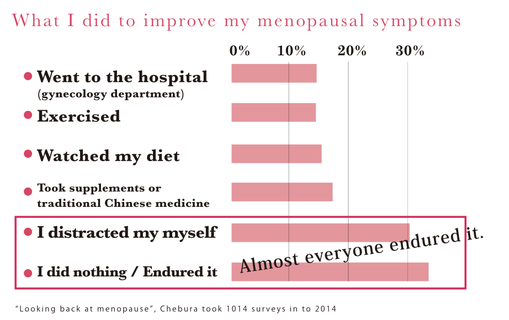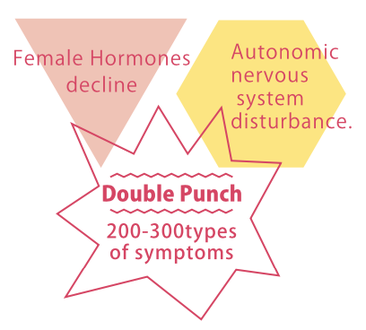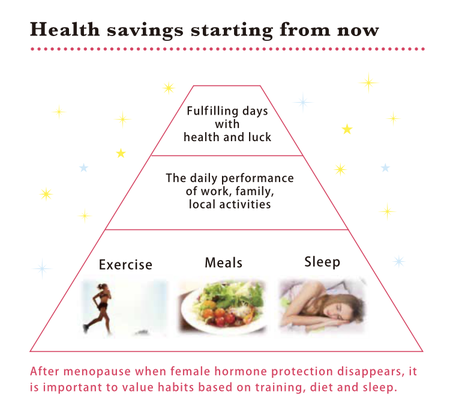Japanese / English

What is Chebura
Chebura" means "the change of life". It is a non-profit organization that supports women's health and menopause with correct information and countermeasure exercises. We use menopause as an
opportunity to build a foundation for enjoying the 100-year life era.
What is Menopause? (Women)

Menopause is a path we all take. It is a period of ten years before and after menopause for women, roughly between the ages of 45 and 55. During this period, 90% of women feel physically and mentally uncomfortable. One out of every four women who feel "painful" will experience menopausal symptoms that interfere with their daily lives.
However, the symptoms vary greatly from person to person and come in many different types. Many women "put up with it" even though they feel it is painful. As society changes, the way women live and work is becoming more diverse, and the strain caused by physical ailments is not only felt by the individual, but also has a great impact on the family, workplace, and community.
However, menopause can be prevented and managed by knowing the correct info and taking countermeasures.

Based on the results of a survey of 1014 women, we at Chebura provide three things that are truly necessary for those who are going through menopause.
1) Correct Information
2) Chebura Exercise
3) Community
Three Reasons for Menopause and the Efforts of "Chebura"
Have you ever wondered why some people have mild symptoms while others have severe symptoms, even though we all experience dynamic changes in female hormones during menopause? Actually, there are three reasons why some people go through menopause.
(1) Physical factors
A sudden drop in female hormones and disturbances in the autonomic nervous system can cause a variety of mental and physical symptoms. (Sweating, hot flashes, cold, numbness, insomnia, anxiety, irritability, joint pain, dry skin, etc.)
▶︎Chebura's Measures
"Chebura exercises" will help regulate the autonomic nervous system. (Breathing to regulate the autonomic nervous system, relieve stiff shoulders, prevent urine leakage, etc.)
Others: Mat exercises, balance ball exercises, etc.

(2) Life Style Factors
Changes in the life style around us, such as nursing care, children leaving home, and assuming a position of responsibility at work. When we are not in good shape, we are more susceptible to damage from things that normally don't bother us.
▶︎Chebura's Measures
"Life Career Design Work" This work gives you a bird's eye view of the "turning points" in your life throughout your life. This is a work that allows you to take a bird's eye view of the "transitions" in your life. Even if the same changes occur, the way you perceive and spend your time will change depending on whether or not you are prepared for them.

(3) Psychological factors
It is generally believed that one's temperament, such as a sensitive or serious personality, has something to do with it. However, these hurdles can be greatly reduced by "knowing" menopause correctly and having friends with a shared theme.
▶︎Chebura's Measures
We hold "Female Hormone and Body Secrets" courses that explain the mechanism of menopause and how to take care of it in an easy-to-understand manner, and we also create communities that share the common theme of menopause.

The relationship between exercise and menopausal symptoms
Menopausal symptoms are a double whammy of low female hormones and autonomic nervous system disturbances. Therefore, exercise is recommended for menopause. Moving your body has the effect of switching between an excited and a relaxed state of the autonomic nervous system and regulating it.
Therefore, it has been proven to be effective in alleviating menopausal symptoms caused by autonomic nervous system disturbances. In addition, for women, maintaining muscle tone through exercise habits is important not only for current comfort but also for future health.

The table shows the change in the Simplified Menopause Index* before and after participating in the "Chebura" seminar. It can be seen that menopausal symptoms are alleviated more after participating in the seminar (after doing the exercises) in almost all symptoms.
What are the symptoms of menopause?

It is said that there are 200 to 300 different types of menopausal symptoms caused by the double punch of a sudden drop in female hormones and a disturbance in the autonomic nervous system.
Both female hormones and the autonomic nervous system are involved in various functions of the whole body. Therefore, if they are out of balance, various symptoms will appear in the mind and body.
If you feel that you are going through menopause, you may have some symptoms. On the other hand, on the mental side, there are many people who feel angry and irritable, or depressed and worrying.
Other symptoms : flushing, sweating, insomnia, motivation, dizziness, irregular menstruation, headaches with irregular bleeding, dry skin, eczema, dry mucous membranes (eyes, nose, vaginal dryness), itching, easy spotting and dullness, stiffness and numbness in the hands and feet, coldness in the waist and limbs, feeling down, forgetfulness, and an increased urge to urinate.
There is always an end to menopause.
One thing to remember is that there is always an end to menopausal symptoms. Once your body gets used to the drop in sex hormones, the symptoms of autonomic disturbance will subside.
So, you should never be in a hurry to give up your job, your dreams, or make any other important decisions that affect your life. Do it when you are in good health or after you are in good physical condition.
Diseases that can easily be mistaken for menopause

In some cases, you may think it is a menopausal symptom, but it is actually a sign of another disease.
For early detection of diseases, please consult a gynecologist or women's outpatient clinic if you continue to feel unwell with no identifiable cause.
Also, after menopause, when the ovaries stop working, the secretion of female hormones, which protect our health, becomes almost zero. This will lead to changes in cholesterol, blood pressure, and bone mass.
The body changes dramatically from the inside out. After menopause, it is essential to review your basic lifestyle habits such as diet, exercise, and sleep in order to stay healthy and comfortable for the rest of your long life.
For a life that will last for a long time to come.

Health is a basic human right for every individual. Every person has the right to self-determine their own life and their own health. However, we are hard-working people, and we tend to put off taking care of ourselves, saying, "I'm too busy with work now," or "I'm too busy taking care of my family and raising my children.
It's great to be kind to others, but if we push ourselves too hard and end up getting sick or making ourselves cranky, we're not doing ourselves any favors.
First of all, be aware that everyone goes through menopause, and learn to keep your own mind and body comfortable! Even after menopause, your life will continue for a long time to come. Even after menopause, there are many more years of life ahead of us, so let's design the life we want, valuing our work, hobbies, family and social participation.
(Text by Kyoko Nagata, President of NPO Chebura)
Would you like to know more about it?
We have text and video for you.



